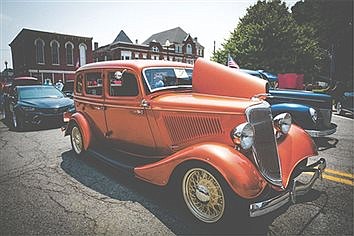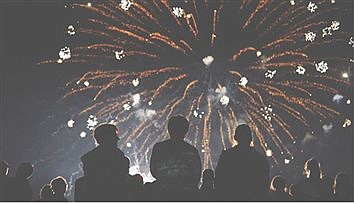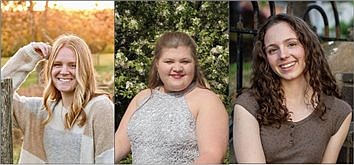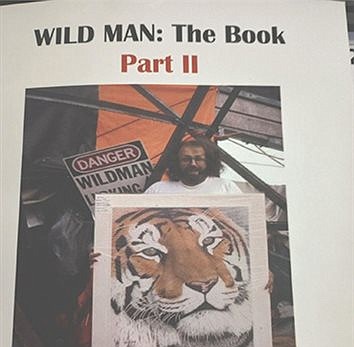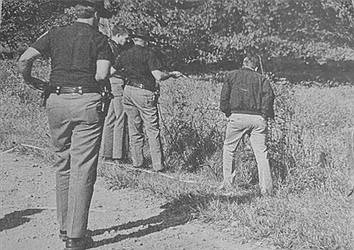Honoring those who serve in the Whitewater Valley: Jeff Houser
May 4, 2022 at 9:43 p.m.

Let us honor US Army Chief Warrant Specialist 5, Craig Jeffery “Jeff” Houser.
For 33 years, Rushville High School students knew Mr. Houser as their history teacher, but Jeff Houser is a history book in himself. Houser was very open to talking about his military experience in Vietnam, even with his students.
Houser grew up in Connersville and graduated from Connersville High School in 1968. There was a strong military presence in his life from his step-grandfather and father who both retired from the Army, but he did not find himself dreaming to join the Army. When Houser was graduating high school, the draft began for male citizens to aid in the country’s fight in Vietnam.
Without some type of deferment, it was likely that you would be drafted into the Army. Deferments could be for multiple reasons, mainly being medical reasons and for going to college. Some other types of deferments that did not last the entire draft were for things like being married or having children.
After high school, Houser worked one factory job after another before deciding to join the military voluntarily about a year after graduating high school. Houser's dad was a pilot, so he joined with the intention of joining flight school.
Houser arrived for basic training in Fort Polk, Louisiana. “They say basic training is eight weeks, but really it's more like ten weeks,” Houser stated. This is because of zero week. “When you first arrive and you are waiting on the rest of your squad, they have you do maintenance, yard work and other basic needs for the base until the rest of the squad arrives and that's when they start your actual time.”
Houser did not fondly recall his experience at basic training. Most of the basic training units were in the South Fort, but Houser's unit was in the North Fort that also housed something they referred to as Tiger Land. This is where the more advanced infantry would train. Houser’s company commander expected his basic training group to compete more with the advanced group than the other basic training units, which was hard to do coming from a small town in Indiana.
After basic training, Houser was given a two-week leave before being stationed in Fort Wolters, Texas, for primary flight school. The first month of training was all in the classroom. Houser, who flew often with his father, thought he would have an advantage in flight school, but “helicopters were a whole new animal,” Houser recalled.
The first round of flight training was very intense and not everyone made it through. “Some were kicked out, some dropped out and we even lost some on in-flight training exercises,” Houser said. “If you made it through, you moved on to Fort Rucker in Alabama for advanced training.” The advanced training course took approximately four and a half months. This is where the soldiers transitioned into the UH-1 helicopters, known by the soldiers as “Hueys.”
After his advanced training, Houser received a thirty-day leave before being deployed to Vietnam. “It was a culture shock in every way. You can't even begin to explain it,” Houser remembered. “Vietnam was literally on the other side of the world. If I could call my mom, there was a twelve-hour time difference.”
Houser said it was very difficult to get a class A phoneline to call the United States and was only able to do it a few times in his whole stay at Vietnam. Which left the only form of communication back and forth with family and friends as mail. Letters would take a week to ten days just to travel one way. Meaning if you asked a question in a letter you sent, you would not receive an answer for a minimum of two weeks.
“You don't just walk into your job when you get to Vietnam,” Houser said. “You're going to be there for at least a couple of weeks before you get in with your squad.”
Houser arrived first at a reception station, and they decided what unit he should be in based off his training, experience, and other qualifications. They needed scout pilots and being young and single, Houser volunteered for the job. He was stationed in the First Air Cavalry Division (Airmobile).
Houser was assigned a OH-6, which was much smaller than the Hueys he was used to in flight school. Being smaller also meant they were more agile and moved quicker as well. These aircraft were used to fly as low to the trees as possible and the pilots would fly slowly in order to look through the trees and gather information to report back to the Cobra gun ship above them.
During Houser's assignment in Vietnam, the unthinkable happened. He was gunned down on March 10, 1971, while performing a mission over top of Cambodia. Houser, along with his observer and his gunman, were reported missing in action. Houser walked out of the forest on March 13, almost four days later. Unfortunately, his observer was killed in action, and his door gunner is still listed as missing to this day although he is presumed dead, even by Houser. His Cobra observer ship also suffered damage but was able to stay in the air and return to safety.
After getting back to the base, he asked his commander if anyone had told his mother and they said they had not. He was then given a class A phoneline to call his mother. She did not know that he had been shot down and Houser didn't tell her either. Later that day, the Army had sent a car to his mother’s home in Connersville to inform her about the events that happened to her son. It took a lot of time to convince her that they were talking about the right person.
Houser suffered no broken bones during the crash, but was burned and is now blind in his left eye. After treatment he was sent back to his unit where he contracted malaria ten days later. He was transferred to a few different hospitals and was away for many weeks before returning.
Upon his arrival, his commander did not want him to fly, so he made him a liaison officer for the new members until the Cambodia situation was over and his unit was disbanded. Thankfully, Houser had enough time in the country when his unit disbanded to return to the states. He was granted a thirty-day leave when returning to the United States. Then he was stationed at Fort Knox, Kentucky for a few months. He decided to take advantage of a new program offered to warrant officers that offered them an early out.
In civilian life, he went back to his factory job just long enough to remember why he hated it. Houser decided to risk it all and returned back to school. He attended Ball State University and got a four-year degree in three years by taking extra classes and summer school. In 1975, he graduated with a bachelor's degree in social studies secondary education, and was offered a position at Rushville High School that same year.
He continued to be a Huey pilot out of the National Guard facility in Shelbyville, which was the only Indiana Army National Guard in the state with a pilot program.
He retired in 2008 but still serves the community in many ways. Houser is a part of the Rush County Historical Society, a member of the advisory planning commission and also serves on the Board of Zoning Appeals.
In closing, the Whitewater Publication staff would like to say, "Thank you, Chief Warrant Officer Jeff Houser, for your service in the US Army. Thank you for doing your part to keep our country and community safe. We wish the best of luck to the Houser family with all their future endeavors."
Latest News
E-Editions
Events
Let us honor US Army Chief Warrant Specialist 5, Craig Jeffery “Jeff” Houser.
For 33 years, Rushville High School students knew Mr. Houser as their history teacher, but Jeff Houser is a history book in himself. Houser was very open to talking about his military experience in Vietnam, even with his students.
Houser grew up in Connersville and graduated from Connersville High School in 1968. There was a strong military presence in his life from his step-grandfather and father who both retired from the Army, but he did not find himself dreaming to join the Army. When Houser was graduating high school, the draft began for male citizens to aid in the country’s fight in Vietnam.
Without some type of deferment, it was likely that you would be drafted into the Army. Deferments could be for multiple reasons, mainly being medical reasons and for going to college. Some other types of deferments that did not last the entire draft were for things like being married or having children.
After high school, Houser worked one factory job after another before deciding to join the military voluntarily about a year after graduating high school. Houser's dad was a pilot, so he joined with the intention of joining flight school.
Houser arrived for basic training in Fort Polk, Louisiana. “They say basic training is eight weeks, but really it's more like ten weeks,” Houser stated. This is because of zero week. “When you first arrive and you are waiting on the rest of your squad, they have you do maintenance, yard work and other basic needs for the base until the rest of the squad arrives and that's when they start your actual time.”
Houser did not fondly recall his experience at basic training. Most of the basic training units were in the South Fort, but Houser's unit was in the North Fort that also housed something they referred to as Tiger Land. This is where the more advanced infantry would train. Houser’s company commander expected his basic training group to compete more with the advanced group than the other basic training units, which was hard to do coming from a small town in Indiana.
After basic training, Houser was given a two-week leave before being stationed in Fort Wolters, Texas, for primary flight school. The first month of training was all in the classroom. Houser, who flew often with his father, thought he would have an advantage in flight school, but “helicopters were a whole new animal,” Houser recalled.
The first round of flight training was very intense and not everyone made it through. “Some were kicked out, some dropped out and we even lost some on in-flight training exercises,” Houser said. “If you made it through, you moved on to Fort Rucker in Alabama for advanced training.” The advanced training course took approximately four and a half months. This is where the soldiers transitioned into the UH-1 helicopters, known by the soldiers as “Hueys.”
After his advanced training, Houser received a thirty-day leave before being deployed to Vietnam. “It was a culture shock in every way. You can't even begin to explain it,” Houser remembered. “Vietnam was literally on the other side of the world. If I could call my mom, there was a twelve-hour time difference.”
Houser said it was very difficult to get a class A phoneline to call the United States and was only able to do it a few times in his whole stay at Vietnam. Which left the only form of communication back and forth with family and friends as mail. Letters would take a week to ten days just to travel one way. Meaning if you asked a question in a letter you sent, you would not receive an answer for a minimum of two weeks.
“You don't just walk into your job when you get to Vietnam,” Houser said. “You're going to be there for at least a couple of weeks before you get in with your squad.”
Houser arrived first at a reception station, and they decided what unit he should be in based off his training, experience, and other qualifications. They needed scout pilots and being young and single, Houser volunteered for the job. He was stationed in the First Air Cavalry Division (Airmobile).
Houser was assigned a OH-6, which was much smaller than the Hueys he was used to in flight school. Being smaller also meant they were more agile and moved quicker as well. These aircraft were used to fly as low to the trees as possible and the pilots would fly slowly in order to look through the trees and gather information to report back to the Cobra gun ship above them.
During Houser's assignment in Vietnam, the unthinkable happened. He was gunned down on March 10, 1971, while performing a mission over top of Cambodia. Houser, along with his observer and his gunman, were reported missing in action. Houser walked out of the forest on March 13, almost four days later. Unfortunately, his observer was killed in action, and his door gunner is still listed as missing to this day although he is presumed dead, even by Houser. His Cobra observer ship also suffered damage but was able to stay in the air and return to safety.
After getting back to the base, he asked his commander if anyone had told his mother and they said they had not. He was then given a class A phoneline to call his mother. She did not know that he had been shot down and Houser didn't tell her either. Later that day, the Army had sent a car to his mother’s home in Connersville to inform her about the events that happened to her son. It took a lot of time to convince her that they were talking about the right person.
Houser suffered no broken bones during the crash, but was burned and is now blind in his left eye. After treatment he was sent back to his unit where he contracted malaria ten days later. He was transferred to a few different hospitals and was away for many weeks before returning.
Upon his arrival, his commander did not want him to fly, so he made him a liaison officer for the new members until the Cambodia situation was over and his unit was disbanded. Thankfully, Houser had enough time in the country when his unit disbanded to return to the states. He was granted a thirty-day leave when returning to the United States. Then he was stationed at Fort Knox, Kentucky for a few months. He decided to take advantage of a new program offered to warrant officers that offered them an early out.
In civilian life, he went back to his factory job just long enough to remember why he hated it. Houser decided to risk it all and returned back to school. He attended Ball State University and got a four-year degree in three years by taking extra classes and summer school. In 1975, he graduated with a bachelor's degree in social studies secondary education, and was offered a position at Rushville High School that same year.
He continued to be a Huey pilot out of the National Guard facility in Shelbyville, which was the only Indiana Army National Guard in the state with a pilot program.
He retired in 2008 but still serves the community in many ways. Houser is a part of the Rush County Historical Society, a member of the advisory planning commission and also serves on the Board of Zoning Appeals.
In closing, the Whitewater Publication staff would like to say, "Thank you, Chief Warrant Officer Jeff Houser, for your service in the US Army. Thank you for doing your part to keep our country and community safe. We wish the best of luck to the Houser family with all their future endeavors."
